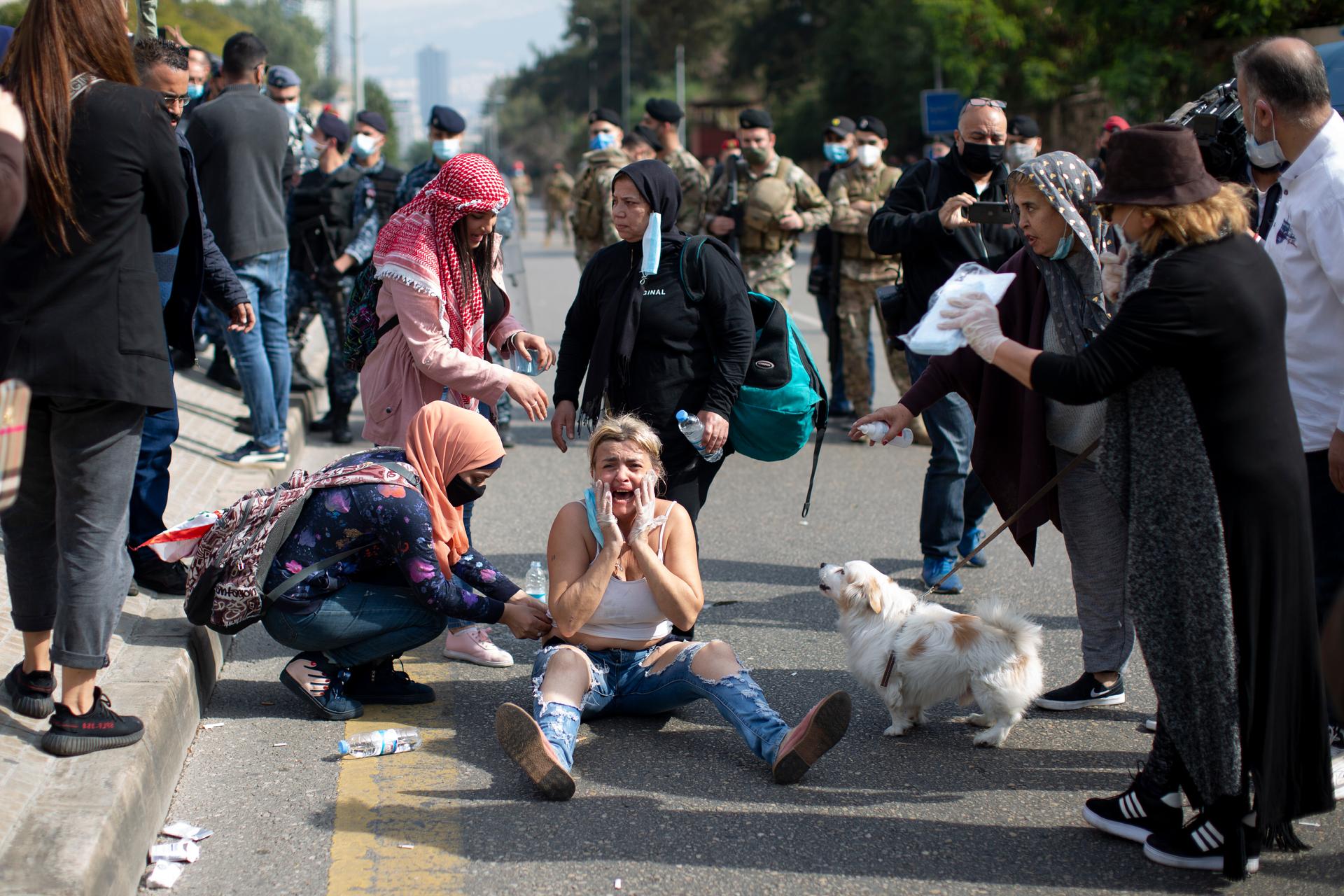Report: Lebanese security used French-made equipment during protests
Jean-Georges Prince, 33, was shot with a rubber bullet at close range on Jan. 18 last year in Beirut.
“The cop that shot me was about 3 meters away so it tore my lower lip,” he said. “I got 56 stitches and a five-hour surgery, and I still don’t have mobility to my lower lip a year later.”
Previously, Prince owned a tattoo parlor in Beirut. He loved his job, he said, but his business was struggling financially. He was also frustrated by the way the Lebanese authorities mishandled one crisis after another. So, when the protests began, he was right on the front lines.
Related: ‘Married to the mountains’: Arab women mountaineers make history
Protesters got beatings here and there, Prince said, but that night in January, when he got shot, it felt like something had shifted.
“I was shocked. I was stunned that they actually started shooting at us.”
“I was shocked. I was stunned that they actually started shooting at us,” he said.
An Amnesty International report published late last month says that Lebanese security forces used weapons from France to suppress protests that have roiled the country in recent years.
The report says that Lebanese security forces unlawfully fired French-made rubber bullets and tear gas canisters at protesters in close range. Some of the French equipment was sold to Lebanon as recently as 2019 and 2020.
Related: Afghan returnees struggle with unemployment, violence at home
Amnesty International is calling on France to suspend weapons sales to the country until the Lebanese authorities “have acknowledged past violations,” according to a statement from the organization.
France’s Foreign Ministry responded to the report, saying that its sales of law enforcement equipment “are subject to a high level of vigilance and are examined on a case-by-case basis by the French authorities.”
The Foreign Ministry also reaffirmed “the right of the Lebanese people to demonstrate peacefully,” and acknowledged that France lends unrelated support to law enforcement “to help them preserve Lebanon’s sovereignty, independence and stability.”
A less benevolent picture
Last August, French President Emmanuel Macron visited Beirut just two days after a tragic blast rocked the city.
He toured devastated neighborhoods, his bodyguards struggling to avoid tripping over glass and debris. In the commotion, one woman elbowed her way past Macron’s bodyguards and got right up next to him.
“Hold those accountable for this entire mess and crisis.”
“Hold those accountable for this entire mess and crisis,” the distraught woman cried, going on to ask that France not give aid money to the same corrupt government officials who brought Lebanon to where it is today.
Related: UN rapporteur emphasizes responsibility to protect ‘vulnerable’ Hazaras
“Your anger is my source of optimism,” Macron replied as he held her hands.
Then, he gave her a hug.
France sent teams of experts to help search for missing people in Beirut along with humanitarian aid. The country’s outreach gave some Lebanese hope that France and other countries might step in and help solve bigger, ongoing issues plaguing the country.
But some say that revelations that France has also supplied anti-riot equipment to Lebanon in recent years undermine that picture of benevolence from abroad.
Crisis after crisis
Lebanon has seen its fair share of protests in the past few years. People have taken to the streets to complain about a slew of grievances — from trash pileup to unemployment to government mismanagement and the Beirut explosion that killed at least 200 people last summer.
Related: Hazara community demands justice for slain coal miners in Pakistan
Often in the protests, security forces used force to disperse crowds and intimidate protesters. Journalists and human rights researchers and protesters have documented police brutality in pictures and videos.
“People lost their eyes and many had to undergo many surgeries and are still undergoing many surgeries because of rubber bullets hitting different parts in their face.”
“People lost their eyes and many had to undergo many surgeries and are still undergoing many surgeries because of rubber bullets hitting different parts in their face,” said Diala Haidar, Amnesty International campaigner in Beirut.
Amnesty found that “over 1,000 protesters [were] rushed to hospitals with different injuries including to their eyes, heads, necks and chests, while hundreds were arrested and unlawfully detained, with most released after a few days.
“Over the following months, the Lebanese authorities investigated over 70 activists involved with the protest movement on criminal charges in an attempt to intimidate them into silence.”
An evolving fight
Prince said several of his teeth were broken, and he had to go on a liquid diet for three months. He lost about 30 pounds, but that didn’t stop him from going back.
Eventually, he realized his activism wasn’t sustainable — that staying alive is more important.
For Prince, who moved to Dubai with his wife, the fight in Lebanon has evolved: He said that protesters need to organize behind-the-scenes to bring about real change — like by putting up their own candidates in local elections.
Prince considers himself lucky. There are other protesters who lost their eyes or suffered even more serious injuries, he said. One person died recently in the city of Tripoli after being shot with live ammunition, according to witnesses.
But Prince said it would be unfair to blame France for what happened to him. The way he sees it, it is the state’s duty to make sure its security forces use anti-riot gear responsibly.
We want to hear your feedback so we can keep improving our website, theworld.org. Please fill out this quick survey and let us know your thoughts (your answers will be anonymous). Thanks for your time!
